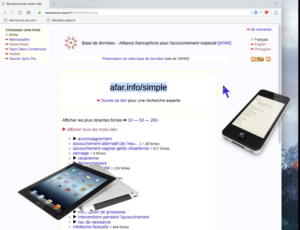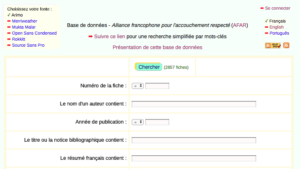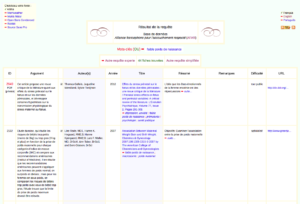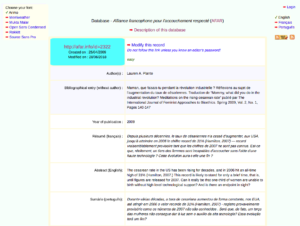➡ Les images de cette page présentent l’interface en français, mais il est possible de naviguer dans les trois langues : français, anglais et portugais
Cette base de données est destinée à répondre à aux besoins de références de publications médicales pour tout ce qui concerne l’accouchement et la périnatalité. Elle peut être utilisée aussi bien par des particuliers (usagers) que par des professionnels…
Elle doit permettre une recherche rapide sur un sujet donné, sans avoir à éplucher les dizaines de journaux publiant sur le sujet, et de se faire une bonne idée générale à la lecture des résumés.
Elle n’est pas orientée vers un agenda particulier mais les biais de sélection des articles sont inévitables. C’est pourquoi nous souhaitons augmenter le nombre de contributrices/teurs pour couvrir un maximum de sujets.
L’interface a été adaptée à la navigation sur tablettes et téléphones portables.
Afficher les 50 plus récentes fiches
Chaîne Youtube : Tutoriel base de données AFAR
➡ Ce qui suit est un résumé du tutoriel.
Recherche simplifiée (par mot-clé)
Suivre un des liens suivants pour afficher la page de recherche :
- Français recherche par mots-clés
- English simplified search (keywords)
- Português pesquisa por palavras-chaves
- Español consulta por palabras claves
Par la suite il est possible de changer de langue en un simple clic et même de choisir un jeu de caractères différent pour l’affichage. (La classe !)
Recherche experte
Présentation des résultats
- En cliquant sur le lien “Voir cette fiche” on accède à la fiche détaillée
- En cliquant sur le lien (colonne “URL”), on accède à la page où est archivé le résumé (en général, sur le site du journal qui l’a publié)
Pratique : utiliser le numéro de la fiche
- A partir du numéro de fiche, un lien court permet d’accéder directement à la fiche.
Exemple pour fiche n°2322 : https://afar.info/id=2322
S’inscrire sur le site : pourquoi ?
Il est recommandé de s’inscrire sur le site de la base de données. Le site n’enregistrera que votre nom et votre adresse électronique, qui resteront confidentiels.
L’inscription donne accès aux services suivants :
- Suivi de la création de fiches en sélectionnant les mots-clés qui vous intéressent
- Participation aux fils de commentaires attachés à chaque fiche
- Accès au mode “édition” pour la création ou la modification de fiches si vous en avez obtenu l’autorisation après votre inscription. Un simple clic permet d’en faire la demande.
Pour vous inscrire cliquez le lien “Se connecter” en haut à droite, puis “Je ne suis pas inscrit·e, créer mon compte…”.
Un site interactif !
Les utilisateurs inscrits sur le site peuvent ajouter leurs commentaires au bas de chaque fiche bibliographique. Une charte définit les conditions d’acceptation de ces commentaires (modérés a posteriori) : ils ont pour objet de compléter l’article et de fournir des liens vers d’autres sources fiables d’information.
Questions/réponses sur la bibliographie
Depuis quand cette bibliographie existe-t-elle ?
2003
L’accès est-il payant?
Non
Par qui est-elle alimentée ?
Par des bénévoles, membres ou non de l’AFAR
Par qui est-elle développée ?
Par des membres de l’AFAR, avec de nombreux dispositifs de sécurisation.
On peut suivre le journal des modifications ici.
Cette bibliographie est-elle exhaustive ?
Non, elle est alimentée de manière non-systématique lorsque des articles sont identifiées comme importants pour les usagers, ou lorsqu’une revue systématique est effectuée sur un sujet particulier.
Quelles informations sont répertoriées pour chaque publication?
- le titre,
- les auteurs,
- le journal et année de parution,
- des mots clés spécifiques de cette base de données,
- l’adresse web où se trouve la publication (résumé ou texte intégral, s’il est accessible)
- le résumé de la publication dans sa langue d’origine et si possible traduit dans les deux autres langues
- éventuellement, des commentaires/analyses ou un liens vers des pages de discussion
- depuis 2009, le DOI (digital object identifier, code qui identifie toute publication)
Y trouve-t-on le texte intégral de tous les articles ?
Dans tous les cas, les articles sont soumis à “copyright”, autrement dit leur diffusion est soumise à certaines conditions. Si une version de l’article est en accès gratuit sur le web, nous archivons une copie du contenu en accès public ou privé selon le statut de copyright.
La majorité des journaux de biomédecine ne sont pas encore en accès ouvert : pour accéder au contenu d’un article récent il faut donc, soit être abonné·e au journal, soit acheter les articles sur le web, souvent une trentaine d’euros l’article quelle que soit sa taille.
Il est aussi possible de demander directement un tiré à part aux auteurs, ou de s’adresser à la Bibliothèque Inter-Universitaire de Médecine (BIUM) — succès non garanti aux non professionnels…
Comment contribuer ?
Vous savez (ou souhaitez apprendre) à faire des recherches dans les publications médicales, ou lire des résumés le plus souvent en anglais et faire une rapide analyse, ou traduire des résumés ? Le sujet des pratiques médicales lors de la grossesse ou de l’accouchement vous intéresse ?
Si vous souhaitez contribuer à alimenter cette bibliographie, vous pouvez vous inscrire sur la base de données et demander à bénéficier des droits d’édition.
➡ Cliquer le lien “Se connecter” en haut à droite de chaque page, puis “Créer mon compte”.
Vous pourrez alors ajouter/modifier des fiches (ajout de résumé, commentaire, texte intégral) en bénéficiant de l’aide des personnes administratrices. Certains travaux fort utiles ne nécessitent aucune compétence en documentation, par exemple mettre à jour les liens vers les publications saisies antérieurement.
Vous pourrez aussi importer dans la base de l’AFAR une bibliographie que vous avez constituée avec l’outil Zotero :
- envoyez-nous l’export Zotero au format EndNote/Xml, nous l’importerons dans notre base
- ou inscrivez-vous et demandez-nous un accès administrateur pour effectuer l’importation vous-même.
Télécharger la méthode d’importation Zotero (PDF)
| Pour une recherche exhaustive de références médicales, consultez PubMed (National Center for Biotechnology Information). Un mode d’emploi en français vous est proposé par l’Université de Montréal. | For an exhaustive query of the medical literature, please connect to PubMed (National Center for Biotechnology Information). |
| Un index d’articles scientifiques sur la grossesse et la période “primale” des bébés peut être consulté au Centre de recherche en santé primale. Un autre répertoire important sur la pratique de sage-femme est celui de UK Midwifery Archive. | The Primal Health Research Centre provides an index to the scientific literature relative to pregnancy and the “primal” period of babies. Another important source on midwifery practice is the UK Midwifery Archive. |
➡ Pour vous familiariser avec la lecture critique d’articles en biomédecine, nous vous conseillons l’ouvrage du Dr. Alexis Clapin : Enquêtes médicales et évaluation des médicaments : De l’erreur involontaire à l’art de la fraude. Editions Désiris (2018). https://leti.lt/oi79






Ping : Veille en temps réel sur les revues médicales - Alliance francophone pour l'accouchement respecté